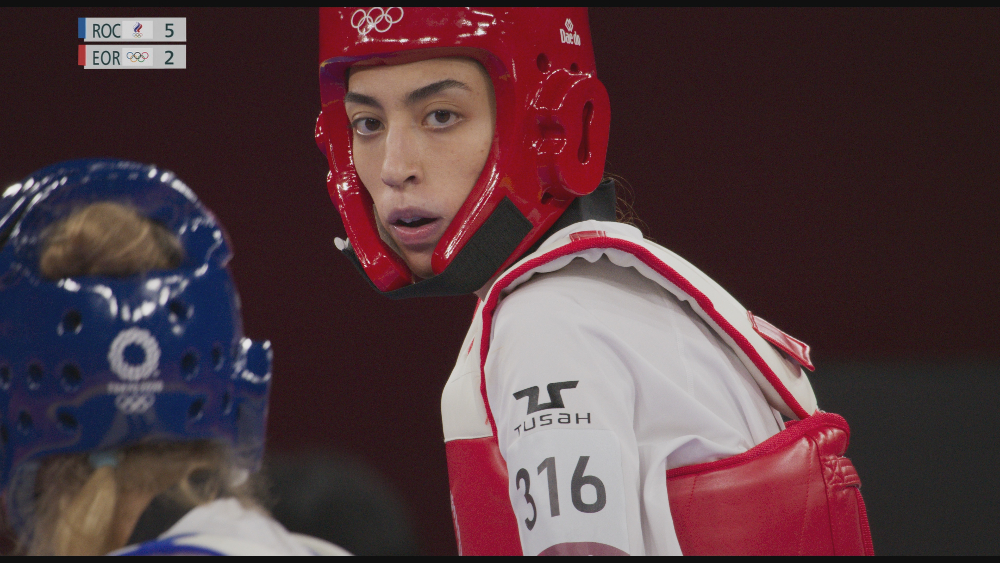
Airbnb co-founder Joe Gebbia is the latest high-net-worth individual to get involved in the documentary business. As a producer on Waad Al-Kateab’s “We Dare to Dream,” about the refugee Olympic team at the 2020 Olympics in Tokyo, Gebbia not only helped fund the project, he also played an active role in the film’s pre-production, production, and edit.
“We Dare to Dream” is Al-Kateab’s second feature docu. In her first film, “For Sama,” which was nominated for an Academy Award, the Syrian director used her camera to capture her daily life during the siege of Aleppo.
Gebbia produced “We Dare to Dream” alongside Violet Films’ Joanna Natasegara (“Virunga”) and Abigail Anketell-Jones (“The Edge of Democracy”) and XTR’s Bryn Mooser and Kathryn Everett. Angelina Jolie recently signed on as an executive producer on the project. Gebbia joins fellow philanthropists Laurene Powell Jobs (Concordia Studio), Jeff Skoll (Participant Media) and Jim Swartz (Impact Partners) in the docu investment business.
Variety spoke with Gebbia and Al-Kateab about “We Dare to Dream,” which is debuted at Tribeca Festival on June 11, with more screenings June 16 and 17.
Joe, was your role as a producer on “We Dare to Dream” different from your role as an executive producer on Sam Osborn and Nick Capezzera’s 2020 docu “Universe”?
Gebbia: The answer is yes. With “We Dare to Dream,” I played a much more active role working closely with Waad, Joanna and XTR to help shape the film. It was a much closer collaboration on “We Dare to Dream.”
Joe, the doc was your idea. What made you think the refugee Olympic team would make a good film?
Gebbia: I remember watching the Rio 2016 Summer Olympic Games. It was the introduction of the first-ever Olympic refugee team created by the IOC (International Olympic Committee). At that time, 65 million people were displaced worldwide, and of course (some were) professional athletes. Without being able to compete for their host country, the IOC created a team specifically to allow them to compete at the world’s highest state of sport. So, when I found out about the 2020 Olympic refugee team, I decided that I had to get behind this. I’ve had a long-standing commitment to the topic of refugees, going back many years to the origins of airbnb.org, where we use our platform to help house those who’ve been displaced, either from national disasters or, in the last couple of years, those seeking asylum. Through that work, I got deeply involved in becoming an advocate for those who’ve been displaced. It’s truly a global problem, and it’s only getting worse. I’ve always aspired to use storytelling to help bring the human aspect of the displacement and the refugee global crisis to people’s screens in their living rooms, and to do it in a really compelling way.
Waad, you used your own first-person video footage to construct “For Sama.” Was it daunting to take on this project, which follows five athletes and required more than one camera and one mic?
Al-Kateab: Being a refugee in the U.K. now, and living my life here with the same challenges that these athletes were going through in their personal life and professional life, their stories, to me, felt very intimate. That said, I was really scared and excited at the same time about this project. In “For Sama,” I was quite alone, and I was learning how to make a film. The learning process kept going with this project.
Joe, documentaries aren’t known for their box-office numbers. Why did you want to get into the business of nonfiction filmmaking?
Gebbia: “We Dare to Dream” is an extension of the advocacy and the work that I’m already doing in the space of refugee displacement.
Given the current landscape, how do you feel about selling the film out of Tribeca?
Gebbia: I’ll just say that the film is a great film for any distributor who wants an inspirational family-friendly story. I think that there’s a pretty big audience for that.
What impact are you hoping the doc makes?
Al-Kateab: This is a very important and very inspiring story for little kids around the world who are refugees and who are not refugees. It reminds us that we all have dreams. We all deserve to have dreams and to have opportunities. So, we need to uplift each other as human beings.
Joe as the founder of Studio Gebbia, are you looking to produce more docus?
Gebbia: Yes. This is the beginning of building a body of work and a library to tell really compelling stories like this one.
What kind of docs are you looking to get behind?
Gebbia: Ones with a great story that make people feel something.













